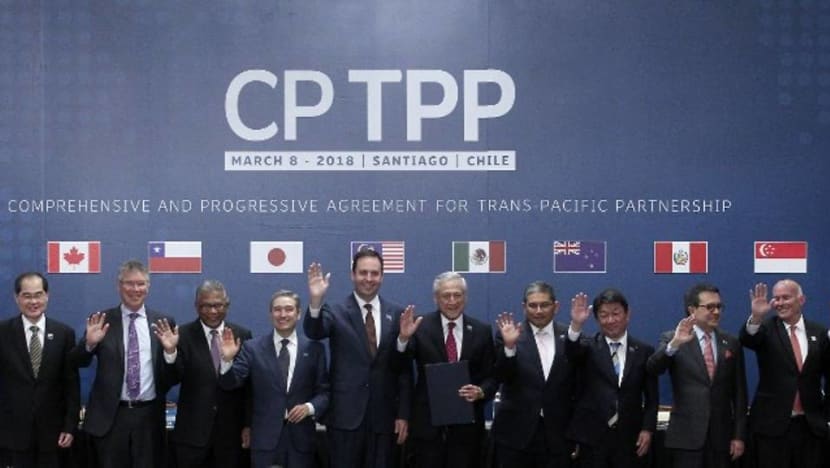CPTPP to boost Singapore’s total exports, GDP by 0.2%

Ministers pose for an official picture after signing the rebranded 11-nation Pacific trade pact Comprehensive and Progressive Agreement for Trans-Pacific Partnership (CPTPP) in Santiago, on Mar 8, 2018. (Photo: CLAUDIO REYES/AFP)
SINGAPORE: As one of the 11 member nations, Singapore stands to benefit from the Comprehensive and Progressive Agreement for Trans-Pacific Partnership (CPTPP), which is expected to boost its total exports and gross domestic product by 0.2 per cent by 2035.
Greater business and investment opportunities are also on the cards, said Minister for Trade and Industry Chan Chun Sing in Parliament on Monday (Aug 6). This includes better access into other CPTPP markets, especially Mexico and Canada where Singapore does not have bilateral free trade agreements (FTAs).
Also dubbed the TPP-11, the CPTPP was negotiated and signed on Mar 8 by Australia, Brunei, Canada, Chile, Japan, Malaysia, Mexico, New Zealand, Peru, Singapore and Vietnam, following the withdrawal of the United States.
For a deal that looks to reduce tariffs in economies that account for 13.5 per cent of the global economy and represent 500 million people with a combined GDP of about S$13 trillion, it is expected to generate an additional S$147 billion in global income.
Mr Chan said the benefits of the landmark deal will be spread across many industries and sectors in Singapore.
Goods producers based here, especially processed food, textile, and apparel manufacturers, will enjoy preferential tariffs when exporting to a CPTPP market.
Services providers will also have preferential access in a wide range of sectors. These include transport and distribution services in Australia, energy and telecommunications in Mexico, as well as professional services in Canada.
For investors, foreign equity restrictions in the private healthcare, telecommunications, courier, energy and environmental services sectors in Brunei, Malaysia and Vietnam will be removed.
The CPTPP will also open up government procurement projects in Malaysia, Mexico and Vietnam to foreign bidders.
CPTPP A COMMITMENT TO FREE, OPEN TRADE: CHAN
Beyond specific business opportunities, Mr Chan said the CPTPP establishes a common set of enforceable rules that govern trade and investment in the 21st century.
These include rules in the areas of e-commerce, innovative industries and provisions to help small and medium-sized enterprises.
“The ratification and pending entry into force of the CPTPP is a strong affirmation of the parties’ commitment to free and open trade and a rules-based trading system," he said.
To help companies understand the benefits of the CPTPP, MTI is working with its agencies, the Singapore Business Federation, as well as trade associations and chambers, to conduct outreach sessions.
Economic agencies including Enterprise Singapore and the Economic Development Board will also help local firms with their plans to access or establish supply chains in the CPTPP markets, said Mr Chan.
Singapore ratified the trade pact on Jul 19, becoming the third nation to do so after Mexico and Japan. The CPTPP will enter into force 60 days after six of the 11 signatories ratify the agreement.
Mr Chan expects this to happen in the first quarter of 2019, as three more member countries are likely to complete ratification by the end of the year.
When asked by Jurong GRC Member of Parliament Ang Wei Neng on the possibility of United States rejoining the trade pact, Mr Chan replied: “Our focus at this point in time is to get the CPTPP to enter into force and subsequently, the US can make its decision as to whether it wishes to join.”















